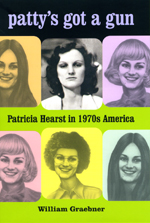The Economist on Patty’s Got a Gun
 Does the election of Barack Obama signal the end of the culture wars, the end of the politics of polarization? If you can’t sink a candidacy with the ankle weight of a ’60s-era bomber, has that decade’s grip on our politics finally been broken?
Does the election of Barack Obama signal the end of the culture wars, the end of the politics of polarization? If you can’t sink a candidacy with the ankle weight of a ’60s-era bomber, has that decade’s grip on our politics finally been broken?
Once the partisans have been cleared out of the way, the historians are unencumbered. For instance, William Graebner in Patty’s Got a Gun: Patricia Hearst in 1970s America.
In April 1974, twenty-year-old newspaper heiress Patricia Hearst robbed a San Francisco bank in the company of members of the Symbionese Liberation Army—who had kidnapped her nine weeks earlier. What was she? Traumatized victim, brainwashed zombie, or domestic terrorist? From a review yesterday in the Economist:
What makes this book worth reading is not so much the first half, a compelling enough account of Ms. Hearst’s kidnapping and subsequent time in the headlines, as the second half: an attempt to put the Hearst affair in the context of an America struggling to emerge from the Vietnam quagmire and the ignominy of Watergate. The America of the 1970s, he argues, was ridding itself of the legacy of the “permissive” 1960s, and was preparing for the rightward shift of Reaganism and an emphasis in the 1980s on the individual.… As Mr. Graebner puts it, it is possible that in a different decade Ms. Hearst might well have been acquitted.
We also have an excerpt from the book and an audio interview with the author.